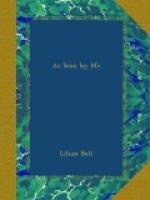My sister promptly turned her back on me.
“And Billy has just wakened from his nap, and Katy is giving him his food,” I went on. (Billy is my sister’s baby.) “And then mamma will come into the nursery presently and take him while Katy gets his carriage out, and she will show him my picture and ask him who it is (because she wrote me she always did it at this time), and then he will say, ‘Tattah,’ which is the sweetest baby word for ‘Auntie’ I ever heard from mortal lips, and then he will kiss it of his own accord. Mamma wrote that he had blistered it with his kisses, and it’s one of the big ones, but I don’t care; I’ll order a dozen more if he will blister them all. And then she will say, ’Where did mamma and Tattah go?’ and he will wave his precious little square hand and say, ‘Big boat,’ and she says he tries to say, ’Way off’—and, oh, dear, we are ’way off’—”
“Stop talking, you fiend,” said my sister, from the depths of her handkerchief. “You know I look like a fright when I cry.”
“Boo-hoo,” was my only reply. And once started, I couldn’t stop. That deadly English atmosphere of indifference—and, oh—and everything!
Have you ever been homesick when you couldn’t get home? Have you ever wanted to see your mother so that every bone in your body ached? Have you ever been in the state where to see the baby for five minutes you would give everything on earth you had? That was the way I felt about Billy that grewsome night at this amusing play in an English theatre. I had on my best clothes, but after my handkerchief ceased to avail the tears slopped down on my satin gown, and the blisters will remain as a lasting tribute to the contagion of a company of English people out enjoying themselves.
My sister’s stern sense of decorum caused her to contain herself until she got home, but I am free to confess that after I once loosed my hold over myself and found what a relief it was, I realized the truth of what our old negro cook used to say when I was a child in the South, and asked her why she howled and cried in such an alarming manner when she “got religion.” She used to say, “Lawd, chile, you don’t know how soovin’ it is to jest bust out awn ’casions lake dese!”
Happy negroes! Happy children, who can “bust out” when their feelings get the better of them! Civilization robs us of many of our acutest pleasures.
That night on the way home from the theatre I learned something. Nobody had ever told me that it is the custom to give the cabby an extra sixpence when one takes a cab late at night, so, on alighting in front of our flower-trimmed lodgings, I reached up, deposited my shilling in his hand, and was turning away, when my footsteps were arrested by my cabby’s voice.
Turning, I saw him tossing the despised shilling in his curved palm and saying:
“A shillin’! Twelve o’clock at night! Two ladies in evenin’ dress! You ought to ‘a’ gone in a ’bus! A cab’s too expensive for you! I wish you’d ‘a’ walked and I wish it had rained!”




